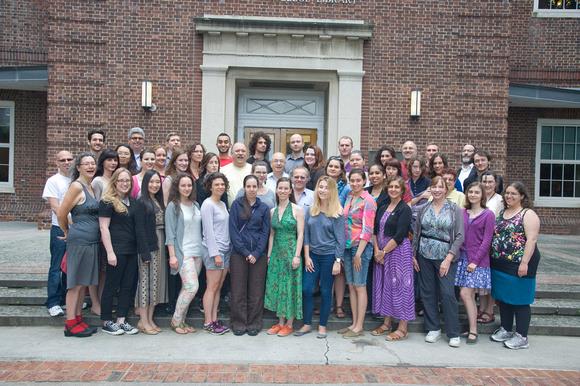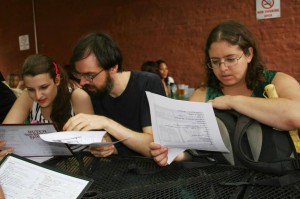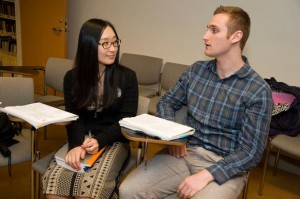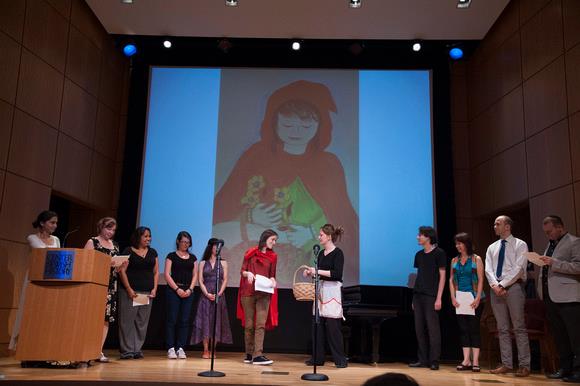Uriel Weinreich Summer Program in Yiddish Language, Literature, and Culture, June 17-July 26, 2013
by JENNIFER YOUNG

On July 26, teachers, family and friends gathered in the YIVO auditorium to congratulate the 40 students graduating from the 46th annual Uriel Weinreich Summer Program in Yiddish Language, Literature, and Culture. Held this year at Brooklyn College, students spent the morning studying language and literature at elementary, intermediate, and advanced levels, with teachers Sheva Zucker, Paula Teitelbaum, Anna Gonshor, and Itay Zutra. After lunch, students participated in conversation classes three days a week, attended workshops on Yiddish poetry, song repertoire, film, dance, and archival skills, conversed with native speakers, and took afternoon and evening electives in archival research, history, sociolinguistics, theater, and foodways. Sundays were filled with supplementary activities, such as a theater translation workshop with New Worlds Theater Project’s Ellen Perecman, a trip to Yiddish Farm, and tours of the Tenement Museum and the Lower East Side.

Through a jam-packed six weeks, students got to know each other through a variety of off-campus events, such as a lekhayim sho (happy hour) at the Franklin Park beer garden. Conversation teacher Leyzer Burko provided each student with a two-page worksheet full of helpful vocabulary involving alcohol, such as the words for bar (shenk), whiskey (bronfn) and hangover (katsnyomer). At an “oyneg shabes” potluck held at the Brooklyn College Hillel, students participated in creating a shabes meal together, and sang Yiddish songs until early in the morning. One student, although fasting for Ramadan until later in the evening, baked cookies shaped in the letters of the alef-beys, or Yiddish alphabet, for dessert.
In the Foodways of Ashkenaz class taught by Eve Jochnowitz, students discussed such ethnographic questions as, “are there particular Jewish flavors?” They read articles comparing the use of garlic in Jewish and eastern European cuisine, discussed the importance of horseradish and pickles in Jewish life, and learned many idioms that encompassed the range of Jewish cultural and culinary geography, such as, “That pickle is so sour, you can see both Krakow and Lemberg!” (me kon derzen kroke mit lemberik), meaning that, going cross-eyed from the sensation of acidity, one could see from one end of Jewish Galicia to the other. Eve also gave a hands-on demonstration of Jewish culinary arts, and led a walking tour of Greenwich Village, illustrating the ways in which food can be used as a lens into Jewish culture and history, a way of exploring material culture and daily life from a rich and varied perspective.
The Yiddish Theater Lab Performance Workshop, led by Yelena Shmulenson and Allen Lewis Rickman, enabled students to assemble scenes from rarely-performed American Yiddish plays. These materials, drawn from the YIVO theater archives and specially transcribed and adapted for this course, featured well-known Yiddish authors such as Shomer (pseudonym of Nokhem Meyer Shaykevitch), and lesser-known playwrights such as William Siegel, whose play Hayntike Meydlekh recalls contemporary melodrama such as the TV show Boardwalk Empire: it features a gamut of troubled young women, manipulative men, drugs, guns, and sex work. Allen Rickman introduced each piece before it was performed, stressing the fact that this kind of Yiddish theater is rarely seen today because it was scorned by critics, although adored by the Yiddish-speaking masses. By putting this drama back on the stage today, students of Yiddish can not only appreciate an important aspect of early twentieth-century vernacular Yiddish culture, they can be inspired to transport even more forgotten Yiddish plays out of the archives and into the auditorium.

Some students came to the Summer Program with research questions they hoped to answer, as part of ongoing academic projects. They elected to spend their afternoons in the YIVO Library and Archives, and presented their findings on the last day of classes. Aleksandra Imilowska, a full scholarship recipient from Poland, presented her research on Yiddish schools in interwar Poland, drawn from her work in YIVO’s Vilna Jewish Community Council archive. Sarah Myerson, a cantorial student at the Jewish Theological Seminary, interned in the YIVO Sound Archive, and talked about her work digitally cataloguing the Strassfeld Collection of Hasidic nigunim. Tamara Gleason Freidberg discussed her recently completed honors thesis from the National Autonomous University of Mexico, on the history of the Jewish Labor Bund in Mexico. She is now embarking on a Masters thesis on the same topic, and thanked YIVO for helping to fund her two summers of Yiddish language study in the Summer Program, as well as enabling her to attend YIVO’s Winter Program on Ashkenazi Civilization, a series of courses on eastern European Jewish history offered every January. Yitzchak Schwartz, an MA candidate at both Yeshiva University and Bard College, presented the beginnings of his sociological research on religious consumption and change in the Haredi communities in Brooklyn. Focusing on the changing urban landscape of 13th Avenue, Yitzchak explored the impact of high-end kosher food establishments like the grocery store Pomegranate, and how the ready availability of artisanal and gourmet kosher foods changes religious Jews’ relationships to the global consumer culture outside of their own communities. Although their research time this summer was brief, our research fellows were encouraged to apply for this year’s Max Weinreich Center Research Fellowships, to continue their work in YIVO’s collections.
As this year’s Summer Program drew to a close, students became even more busy, squeezing in time to rehearse specially prepared material for the graduation ceremony. The siyem-hazman, as the graduation is called in Yiddish, is a time for students to perform and display their newfound knowledge to friends and peers, in an “open-mike” atmosphere of improvisation. This year’s performances included apple juggling by Noah Schnarch; a stunning rendition of the song “Dona Dona,” in Yiddish and Japanese, from Aya Kiyohisa; an original Yiddish composition in four-part harmony arranged and conducted by Sarah Myerson; and a visually stunning performance of “Red Riding Hood,” translated and adapted by Audrey Newman, who also created full-color illustrations of the story which were illuminated on the stage, behind the performers.

Shane Baker, of the Congress for Jewish Culture, served as YIVO’s artist in residence this year. He gave the keynote address at this year’s siyem, telling the story of how he, as an aspiring actor and Yiddish student, met the famed Yiddish actress Luba Kadison while waiting tables, and thus embarked upon a mentorship in Yiddish performance arts that would impact the rest of his life. Shane, who led a popular workshop this summer on Yiddish vortkunst, the art of Yiddish recitation, encouraged students to delve into Yiddish texts not only to read to themselves, but to speak the words aloud, to hear the rhythm, meter and texture of the living language.
Through YIVO alumni email updates and special events, students can stay in touch with each other, as well as keep up to date on current and upcoming YIVO programs and classes. Many of this year’s summer students are sure to return to YIVO in the coming months. We look forward to seeing them again soon!




